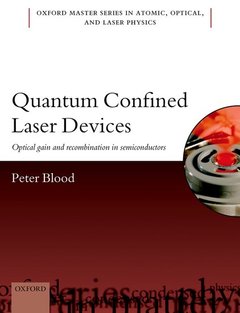Description
Quantum Confined Laser Devices
Optical gain and recombination in semiconductors
Oxford Master Series in Physics Series, Vol. 23
Author: Blood Peter
Language: English
Quantum Confined Laser Devices
Publication date: 10-2015
432 p. · 19.6x24.7 cm · Paperback
Publication date: 10-2015
432 p. · 19.6x24.7 cm · Paperback
Quantum Confined Laser Devices
Publication date: 10-2015
432 p. · 20.4x25.1 cm · Hardback
Publication date: 10-2015
432 p. · 20.4x25.1 cm · Hardback
Description
/li>Biography
/li>
The semiconductor laser, invented over 50 years ago, has had an enormous impact on the digital technologies that now dominate so many applications in business, commerce and the home. The laser is used in all types of optical fibre communication networks that enable the operation of the internet, e-mail, voice and skype transmission. Approximately one billion are produced each year for a market valued at around $5 billion. Nearly all semiconductor lasers now use extremely thin layers of light emitting materials (quantum well lasers). Increasingly smaller nanostructures are used in the form of quantum dots. The impact of the semiconductor laser is surprising in the light of the complexity of the physical processes that determine the operation of every device. This text takes the reader from the fundamental optical gain and carrier recombination processes in quantum wells and quantum dots, through descriptions of common device structures to an understanding of their operating characteristics. It has a consistent treatment of both quantum dot and quantum well structures taking full account of their dimensionality, which provides the reader with a complete account of contemporary quantum confined laser diodes. It includes plenty of illustrations from both model calculations and experimental observations. There are numerous exercises, many designed to give a feel for values of key parameters and experience obtaining quantitative results from equations. Some challenging concepts, previously the subject matter of research monographs, are treated here at this level for the first time.
Peter Blood received a PhD degree from the University of Leeds, UK and subsequently worked at Philips Research Laboratories, Redhill, UK on aspects of the electrical properties of semiconductors, spending some time as a visitor at Bell Laboratories at Murray Hill, NJ. Since 1983 he has been investigating the operation of semiconductor lasers and in 1990 he moved to the School of Physics and Astronomy in Cardiff University where the Group developed techniques for the observation of spontaneous emission from laser diodes as a means of probing their steady-state and dynamic behaviour, and amplified spontaneous emission techniques for the measurement of absorption, gain and spontaneous emission. As well as giving undergraduate and postgraduate lectures courses on laser diodes Peter Blood has given many short courses and review tutorials on quantum confined lasers at international conferences, including CLEO and the International Semiconductor Laser Conference.
© 2024 LAVOISIER S.A.S.




